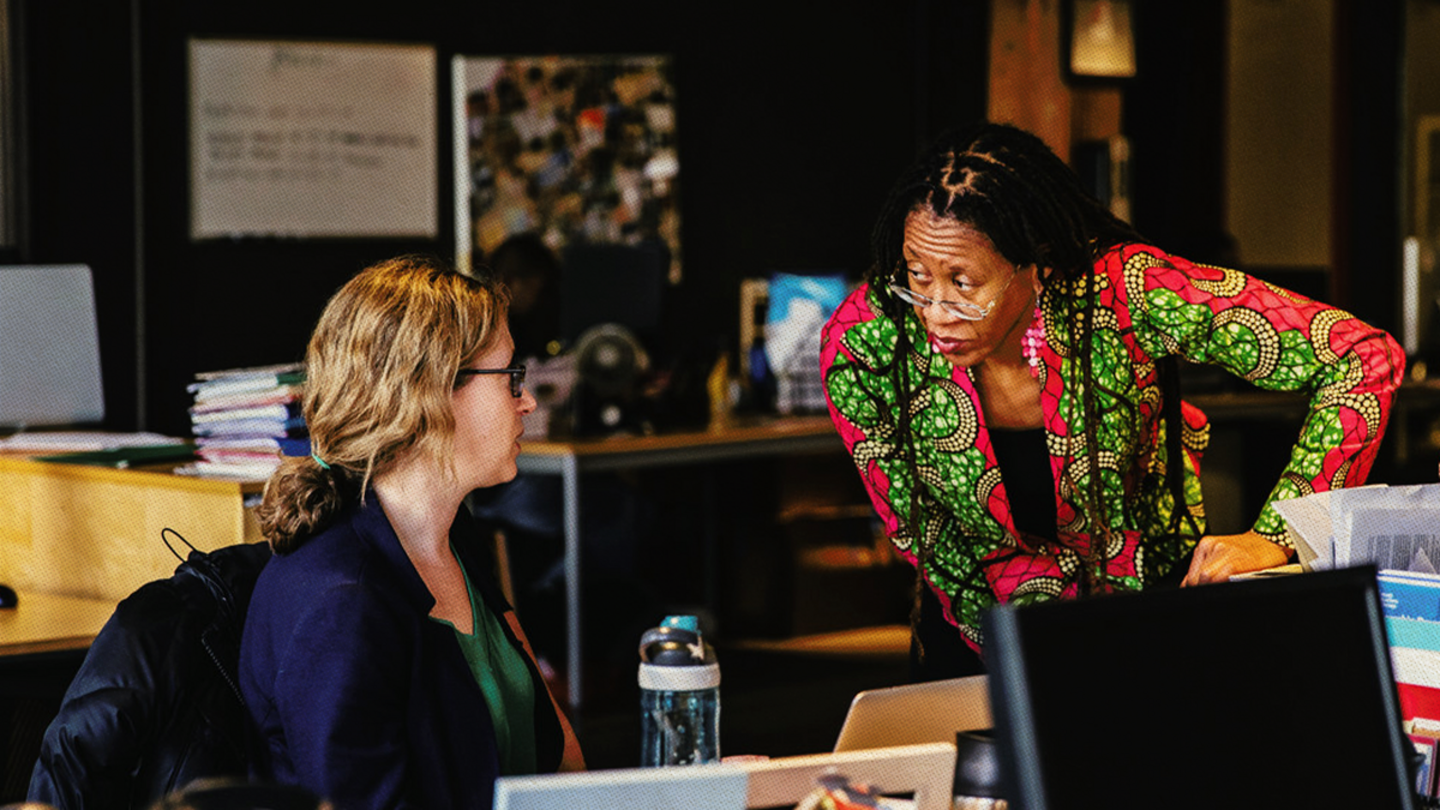After years in the logistics management industry, Moja Chatman had gained a plethora of valuable skills and experience, but he was stuck. Without specific qualifications on his CV, he had no way to transfer those skills to the industry he wanted to join: information technology.
That obstacle wasn’t just affecting Chatman. His potential employers were also unwittingly losing out on the unique talents and background he had to offer their workplaces.
It was through Per Scholas that Chatman was able to bridge the gap. The nonprofit offers upskilling curriculum and certifications specifically designed for adults in the middle of their careers. For individuals at this stage, going back to college often isn’t viable. Carving out two or four years for a new degree, taking on new loans, and figuring out how to work remotely simply aren’t options. Unlike the four-year college degree route, Per Scholas’ courses are flexible, offering participants a shorter-term curriculum on a full-time basis or sometimes even allowing participants to continue working full time while advancing their skills.
Through Per Scholas, Chatman gained new skills, trained with a mentor, and connected with higher-ups at the global bank Barclays. He eventually got a job there working as a data analyst. He’s one of many who are making clear the benefits companies have to gain by hiring employees who don’t have a traditional academic background.
“All these companies have understood, ‘Hey, we have to look into these alternative pipelines and bring in talent from there as well,’” Chatman said. “I was already in the workforce. Having that experience, I just brought that along with me.”
Per Scholas is demonstrating that organizations can leverage alternative education models to create individualized and shorter pathways to high-demand jobs. Once employees enter their new roles, their education is just beginning, as they can continue to gain new certifications and add to their toolbelt.
“They’ll set you on the path, and then they’ll illuminate several paths and say, ‘Hey, take your pick,’” Chatman said.
In doing so, Per Scholas is blowing the marketplace wide open. It’s not just employees who stand to benefit: It’s entire industries. By helping mid-career professionals access new skills and learning opportunities, employers that partner with organizations like Per Scholas are creating stronger, more driven workforces that are prepared to adapt and grow with whatever developments come their way.
Rising debt and falling value
Over the past decade, 4 million fewer young people have enrolled in higher education than before. In addition to the value and direct connection to a job being called into question, the price tag is just too high. According to Business Insider, college tuition has risen about 12% per year since 2010. While costs have ballooned, salaries have remained largely stagnant.
The workplace is suffering as a result. Despite fewer people choosing to attend a four-year college, many workplaces still prioritize — or require — a college degree for many roles. These minimum hiring requirements keep employers from tapping into a large, underused pool of talent — those who didn’t attend a four-year school.
In fact, hiring workers with alternative educational backgrounds can be an advantage for employers. It diversifies the experiences, perspectives, and skills that make up the company’s workforce. And it’s not just young people. Adults are often caught between wanting to shift careers and not having the specific qualifications a job is looking for.
“Applicant tracking systems now make it challenging for a mother who maybe was staying at home and raising her children for 18 years who is now trying to get back in the workforce,” said Brittany Murrey, executive vice president of talent solutions at Per Scholas. “You think about people who might be refugees … or individuals who are over 40 years old and looking to start new careers after they’ve been in the workforce for 20 years. I think anyone that is willing, able, and eager to have a career in tech and is passionate deserves an opportunity to access that career pathway.”
By opening consideration to a variety of educational and professional backgrounds, employers can focus less on an applicant’s degrees and more on how the applicant’s specific skills, experiences, and talents fit the demands of the role.
“More and more, we’re hearing that employers are prioritizing relevant technical skills over more traditional education requirements like a four-year degree,” Murrey said. “Candidates from diverse backgrounds and experiences bring a fresh perspective into these tech roles that has traditionally been missing. By prioritizing skills over traditional barriers … [employers] can widen their talent pool. They can fill their job openings more quickly while also ensuring their teams have the right skills to succeed.”
So, how do employers begin to knock down the walls? For one, they can eliminate four-year degree requirements in favor of equivalent relevant experience. They can also broaden job postings to allow applicants to explain their personal stories and how they see themselves as the right fit for the role rather than requiring a checklist of standard qualifications.
Creating inclusive hiring practices is a win-win for employers and employees alike. Employees who join a new workforce and receive recognition for their unique strengths and talents find more fulfillment in their roles. In return, their workplaces see increased momentum, drive, and focus. This often translates to “a better quality product, higher productivity, and a workforce as diverse as the customers it serves,” Murrey said.
In this way, helping workers access new skills and learning isn’t just a matter of moving up the career ladder. It’s also a way to empower employees to explore their interests and untapped potential so they can pursue a higher level of purpose and give back to their workplaces on a bigger scale.
Sign up for Stand Together's Rethinking Work & Learning newsletter to get the latest stories, ideas, and trends on the future of employment.
How to create a more adaptable workforce
Alternative talent training programs reduce the financial burden on the individual. Per Scholas supports students with free tuition, which unlocks the door for a whole new pool of talent to enter industries that were previously inaccessible to them.
This model has the potential to transform the marketplace itself. Upskilling and development programs like Per Scholas are flexible. They can routinely reassess and expand to meet evolving needs and goals in every industry, especially the tech, cybersecurity, and IT worlds.
Businesses can partner with Per Scholas to craft upskilling courses to meet their evolving business needs. Murrey explained that Barclays was able to partner with Per Scholas to create a cybersecurity curriculum tailored to the bank’s specific needs. The course now feeds a talent pipeline that hiring managers can draw from. Per Scholas is constantly updating its course offerings and providing new skills pathways based on changes and advances in the tech and IT worlds.
Employers can create new processes and ways for their companies to identify the people they employ who are ready to upskill or grow. “In a survey we conducted last year of over 500 decision-makers, 98% of executives were more likely to prefer a candidate who has upskilled or acquired new competencies in their field,” Murrey said.
Increasingly, upskilling programs are being recognized for their ability to create job seekers who can “stay competitive in the future job market. I would say lifelong learning is no longer a luxury but a necessity for both employees and business leaders alike,” Murrey said.
Not only is this strengthening talent, it’s also helping costs: “You think about a person that was maybe hired into a role at a tech company 20 years ago doing work that may soon become obsolete,” Murrey said. “Instead of removing that person from the workforce, it’s cost-effective to simply upskill them and allow them to engage in training outside of regular business hours that is more asynchronous and self-paced.”
For his part, Chatman is excited to continually reflect on his skills and explore ways to advance as an IT professional by signing up for new courses and pursuing new avenues.
“I don’t pigeonhole myself into saying, ‘I want to pursue XYZ,’” he said. Instead, he views his skills and the larger industry more openly, flexibly, and creatively.
“I’m like a kid in a candy store,” he said. “I’m looking to see what [Per Scholas] offers, and I match it against what’s prominent in the world today, and that’s what I pursue in that particular time.”
Employees with opportunities like Chatman’s can substantially strengthen industries. Talent can become outdated and irrelevant when companies rely exclusively on employees’ previous credentials and education. By supporting employees in continually seeking, exploring, and accessing new skills and knowledge, companies ensure their workforce remains fresh, sharp, and highly prepared for whatever industry developments are on the horizon.
Looking ahead, limitless growth for the workforce
Today, Chatman counts his role at Barclays as the most fulfilling he’s ever had — but he’s still pursuing his “dream job.”
“This is far and away the best position I’ve been in during my professional career,” he said. “My dream job is when I’m at the top of the mountain. I’m looking to go higher, and from my perspective, that will never stop.”
Per Scholas continues to provide Chatman with community, mentorship, and accessible education, demonstrating that education doesn’t end when you land the job. It’s just the beginning.
Employers like Barclays that embrace this model of employee growth cultivate a more fulfilled and driven workforce as well as the specific skills and talent they need to advance their industry.
“It has no limits,” Chatman said. “There are no boundaries. … They lay the tools that you need out in front of you and show you how to use those tools. The only thing you have to bring is the desire.”
***
Per Scholas is supported by the Charles Koch Foundation, which, as part of the Stand Together community, funds cutting-edge research and helps expand postsecondary educational options.
Learn more about Stand Together’s efforts to transform the future of work and explore ways you can partner with us.

Here’s how to bridge the disconnect between employers and employees.

Lessons learned from Colorado.

Could a program built to develop music talent change the way we think about education?

How to help the talent of today fill the jobs of tomorrow.
